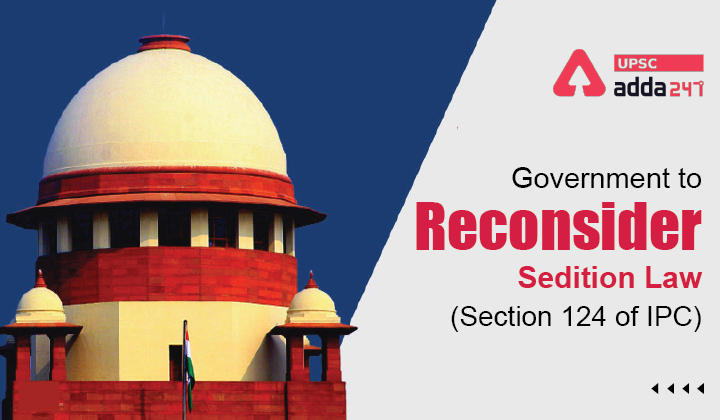Table of Contents
Sedition Law (Section 124 of IPC)- Relevance for UPSC exam
- GS Paper 2: Governance, Administration and Challenges
- Government policies and interventions for development in various sectors and issues arising out of their design and implementation.
Sedition Law (Section 124 of IPC) in News
- Recently, the Ministry of Home Affairs (MHA) informed the Supreme Court of its decision to “re-examine” and “reconsider” the sedition law (Section 124 of IPC).
Government’s Argument for Re-examining Sedition Law (Section 124 of IPC)
- Shedding Colonial Legacy: This is in line with Prime Minister’s vision that India should work harder to shed “colonial baggage”, including outdated laws, while celebrating 75 years of Independence under the banner of ‘Azadi Ka Amrit Mahotsav’.
- Maintaining a balance between Civil liberties and Security of Nation: By reconsidering and re-examining the section 124 of the Indian Penal Code (IPC), government aims to address the concerns of civil liberties and human rights, while maintaining and protecting the sovereignty and integrity of the nation.
- Creating a Competent Forum: The Home Ministry urged the court to wait till the government completes the exercise of reconsideration of the sedition law before “appropriate forum”.
Sedition Law (Section 124A of IPC): Background, Relevance and Challenges of the Colonial Law
What is Sedition Law (Section 124 of IPC)?
- About: It is a crime under Section 124A of the Indian Penal Code (IPC).
- Definition: Section 124A defines sedition as an offence committed when “any person by words, either spoken or written, or by signs, or by visible representation, or otherwise, brings or attempts to bring into hatred or contempt, or excites or attempts to excite disaffection towards the government established by law in India”.
- Disaffection includes disloyalty and all feelings of enmity.
- However, comments without exciting or attempting to excite hatred, contempt or disaffection, will not constitute an offence under this section.
- Punishment under sedition law:
- Sedition is a non-bailable offence.
- Punishment under Section 124A ranges from imprisonment up to three years to a life term, to which a fine may be added.
- A person charged under this law is barred from a government job.
- They have to live without their passport and must produce themselves in the court at all times as and when required.
- Observations made by freedom fighters:
- Mahatma Gandhi called it- the prince among the political sections of the IPC designed to suppress the liberty of citizens.
- Pandit Jawaharlal Nehru said that the provision was “obnoxious” and “highly objectionable” and “the sooner we get rid of it the better”.
सरकार देशद्रोह कानून (आईपीसी की धारा 124) पर पुनर्विचार करेगी
Associated Concerns with the Sedition Law (Section 124 of IPC)
- Violates right to freedom of speech and expression: which is provided by the Constitution as fundamental rights under article 19.
- Widespread misuse: it is being invoked even in cases where there is no incitement to violence or tendency to create public disorder.
- Its provisions are vague and prone to multiple interpretations, for example, ‘public order, ‘disaffection’, etc. This leads to misuse by the government based on their whims and fancies and other narrow political interest.
- The government uses this tool to suppress dissent and criticism of government which is essential ingredients of public policy in a vibrant democracy.
- It is also being misused as a tool to persecute political dissent.
- Other sections of IPC and laws like the Unlawful Activities Prevention Act 2019 have provisions that penalize “disrupting the public order” or “overthrowing the government with violence and illegal means”.
- These are sufficient for protecting national integrity, eliminating the need for a dedicated Section 124A under IPC.
- Britain (introduce sedition to oppress Indians) has already abolished sedition law in its country, prompting India to do so.
Sedition Law (Section 124A of IPC): Background, Relevance and Challenges of the Colonial Law





 TSPSC Group 1 Question Paper 2024, Downl...
TSPSC Group 1 Question Paper 2024, Downl...
 TSPSC Group 1 Answer key 2024 Out, Downl...
TSPSC Group 1 Answer key 2024 Out, Downl...
 UPSC Prelims 2024 Question Paper, Downlo...
UPSC Prelims 2024 Question Paper, Downlo...
